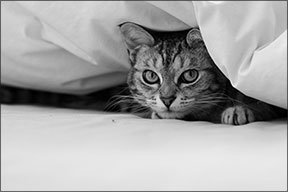They lie in wait around corners, ready to pounce on your ankles. They hunker in the outer reaches of closets, eyes gleaming in semi-darkness, or they stake out favored spots under the bed, in the clothes dryer, and in bags, boxes, mattresses and easy chairs.

Cats who like to hide have very different motivations, says Tracy Kroll, DVM, who completed her residency at Cornell University College of Veterinary Medicine and specializes in animal behavior in Fair Lawn, N.J. “It depends on the personality of the cat.”
Concealing Themselves. Two general categories tend to prevail, however: hunters and ’fraidy cats. “The predatory subgroup of hunter-stalkers is social, and their hunting and play behaviors are intrinsically tied together. Often they’re male cats and they like small areas where they can wait for their prey. It makes sense because cats in the wild hunt rodents and want to conceal themselves. Their prey can see their eyes and whiskers so they make themselves small.”
To avoid being human prey: “Put a bell on the cat,” Dr. Kroll says. “Many collars already have them. Have a cat toy and throw it ahead of you as you walk by. If you have a cat who likes to stalk, get rid of the hiding spot.”
Timid cats seek comfort and safety by escaping stress — noise, new family members, changes in routine. “Fearful cats love dark areas to hide,” Dr. Kroll says. “They’re often young and from outdoors or shelters. They hide for environmental reasons.”
Medical Causes. Some cats hide when they’re ill or in pain. “They’re vulnerable, and, if they can’t defend themselves, it’s natural to want to conceal themselves,” Dr. Kroll says. If this is a new behavior for your cat, a veterinary exam can rule out medical problems.
Multiple-cat households can be a challenge if one is a bully. “Then the other cat is forced to hide,” she says. “Give the victim a safe place to hide and build his confidence with exercise and play. We grossly under-estimate and under-stimulate our cats. I hear people say they got a cat because they ‘didn’t have time for a dog.’ Their cats are not getting their needs met, and they’ll find a way to meet them themselves.” ❖
This is another installment in an intermittent series on cats’ often-intriguing behavior. If you would like to suggest a topic, please email catwatcheditor@cornell.edu or write Editor, CatWatch, 800 Connecticut Ave., Norwalk, CT 06854.



